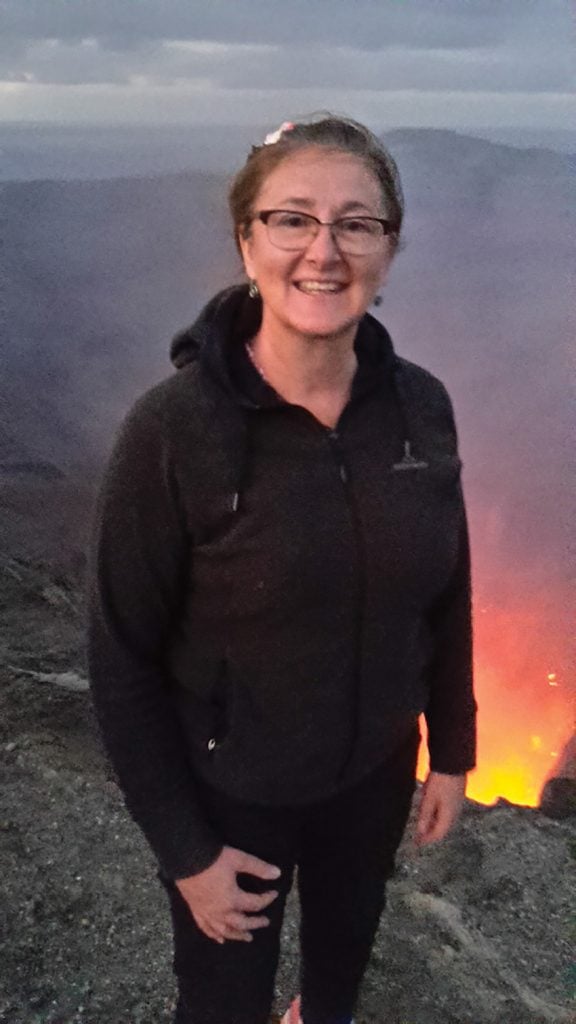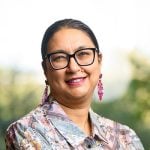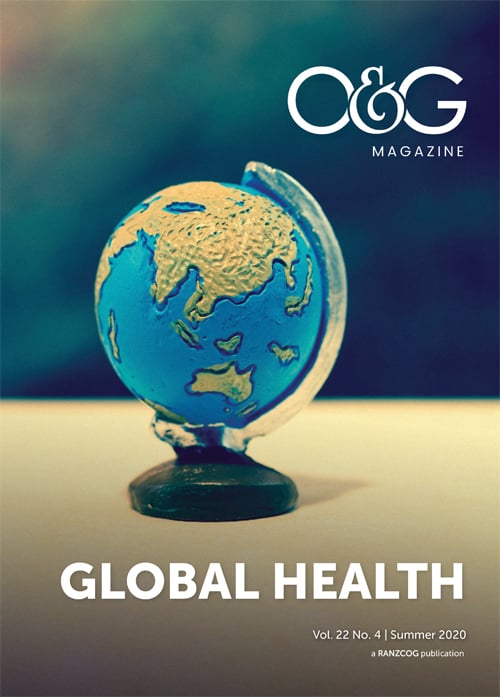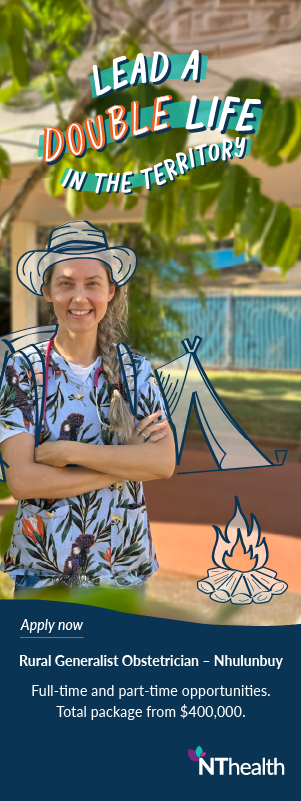This O&G Magazine feature sees Dr Nisha Khot in conversation with RANZCOG members in a broad range of leadership positions. We hope you find this an interesting and inspiring read. Join the conversation on Twitter #CelebratingLeadership @RANZCOG @Nishaobgyn
Dr Sharron Bolitho
FRANZCOG
When Dr Kirsten Conan handed over this column to me, there were two regions she had not interviewed any clinicians from – Tasmania and South Island of New Zealand. I made it my mission to complete Kirsten’s work by interviewing Dr Lindsay Edwards from Tasmania for my first feature. This interview, with Dr Sharron Bolitho, fulfils Kirsten’s aim of representation from each state and territory of Australia and both islands of NZ. I first met Sharron at a PROMPT Train the Trainer course. We found that we both had children who were keen rowers. I admired the work Sharron was doing in the Pacific and wanted trainees and Fellows to know about it. In the years that followed, we have seen each other at various PROMPT-related courses and, of course, at RANZCOG’s Global Health Committee meetings. Our common interest in ensuring that women everywhere have access to safe maternity services has meant that we have stayed in touch despite distance and COVID-19. If readers of this column feel inspired by the articles they read in this issue and by hearing Sharron’s story, please do get involved in global health initiatives. We are only as good as the sum of our parts. Each of us has a part to play to achieve the sum total of health for all.

Dr Sharron Bolito
What does your typical day look like?
A typical day starts with a breakfast of my all-time favourite foods poached egg, spinach (and salmon if I am lucky), watching the sun light up the southern alps at dawn. I cycle to work nearly every day. I have a full-time public hospital appointment. In addition to clinical work, I have educator, RANZCOG, Ministry work and departmental administration that fill my working day. My evenings have become much easier since my wonderful, long-suffering husband started preparing dinner with the help of ‘My Food Bag’ which has revolutionised my life from a ‘decreasing stress at home’ point of view! In the evenings there is usually time to catch up with family, including an adult son back home from College in Boston due to COVID, potter in my beloved garden, as well as do my Pacific work.
Why is cycling to work so important to your day?
I didn’t learn to ride a bike until I was 40 – a consequence of growing up on top of a steep hill in Wellington. Cycling to and from work are two of the most important parts of my day. Cycling allows me to mentally transition from home to work and back again. I struggle with exercise unless it is a routine part of my day and cycling works perfectly for me. I particularly dislike driving to work in my car burning fossil fuel as cyclists whizz past me while I am stuck in traffic! Cycling is so much better for the planet and I like to encourage others to take it up too.
In the Māori world view, each tribe or subtribe (iwi/hapu) has a mountain (maunga) and a river (awa) to which they belong. I have the rare privilege of living on the maunga which my ancestors first saw and lived on when arriving in Aotearoa in 1860s and of riding along my awa to work. I often reflect on deeper and spiritual things while riding beside the river as this is the most peaceful part of the journey. So, as well as exercise, cycling gives me mental/spiritual space and connection to the land (whenua).
What leadership roles do you have?
I am the medical lead for the PROMPT obstetric emergency training program for Canterbury District Health Board (CDHB), as well as part of the NZ National PROMPT leadership team. I am involved in the wider leadership of all CDHB simulation training. I am on the National ACC Neonatal Encephalopathy (prevention) Taskforce Fetal Heart Monitoring working group. I am a FRANZCOG ITP and Advanced DRANZCOG supervisor. I am the Leader for Facilitator Training for the Pacific emergency Maternal and Neonatal Training Programme. I am on the RANZCOG Global Health Committee. While I was Acting Clinical Director, I led a project to revolutionise the way we senior doctors work and I continue to assist the current CD in this area.
What prompted you to choose O&G?
I was always been fascinated by reproduction from very early on at medical school. I took a year out between preclinical and clinical years and spent six months in Bangladesh in obstetrics where I saw my first birth. I was so excited I couldn’t sleep all night afterwards!
In my trainee intern year, I went back to do an elective in Bangladesh with my new husband. When I returned, I was asked to sit for the T R Plunkett O&G distinction viva. At the time, I really didn’t want to as I had had no time to study! However, the T R Plunkett Prize was established following an endowment made by O&Gs throughout New Zealand in memory of Dr Thomas Plunkett, who happened to be my best friend’s grandfather. His widow was my ‘Auckland Gran’ and used to present this prize. She had said to me, ‘I have never presented this to anyone I know. If you go to medical school, I want you to get that prize – no pressure!’ I knew she would be furious if I didn’t even try so I went ahead and sat the exam and (no surprise) won!
Another key decision point in my career was when I was working as a house surgeon at the old National Women’s Hospital. I had completed my Diploma in Paediatrics as well as Obstetrics and I was loving the work I was doing. Prof Colin Mantel called me into his office one day and said, ‘Sharron, I think you should pursue a career in O&G’. I had recently got married and felt I couldn’t have a family and pursue specialist training and do them both the justice they each deserved. To which Prof Mantel said, ‘Let me introduce you to Lesley Mc Cowan, she is successfully doing both’ and marched me straight into her office. The rest is history!
What message do you have for your younger self?
Know yourself; both strengths and weaknesses. These are inevitably different sides of the same coin. The flip side of our greatest strength is also our greatest weakness. Focus on your strengths. Manage your weaknesses.
Instead of trying to please everyone, focus on doing the right, kind and compassionate thing for the person before you.
Avoid spreading yourself too thinly. Just because you can do something and think you can do it better than someone else, doesn’t mean you have to do it all. Let others use their strengths and develop their abilities. Focus on the things where you have a unique set of skills and passions and do that with all your heart.
‘Put on your own oxygen mask first’. Self-care is essential, not a selfish luxury.
Finally, get over yourself. You don’t have to be perfect. No one is. Just do your best!
Could you tell me a little bit about your work in Quality Improvement?
When I was the Tutor Specialist during my first three years of FRANZCOG, I became heavily involved in quality. My first SMO appointment had protected time allocated for quality improvement projects. I introduced monthly quality and education half days for the department, did all sentinel event reviews, met with families, made recommendations for change. A lot of recommendations involved communication and teamwork training and education and system change, obstetric emergency management and fetal heart monitoring skills improvement. I got to the point where I was utterly fed up with making the same recommendations over and over and nothing changing. I decided to change my quality focus and get involved with building a fence at the top of the cliff rather than just analysing all the mess at the bottom.
This helped me crystalise that my absolute passion is preventing avoidable maternal and perinatal mortality and birth injury. This prevention journey has taken me in unexpected directions, deep into systems work and issues, such as reorganising hospital system to provide adequate recovery time for SMOs, human factors issues training, team building, team-based apprenticeship, adult education focusing on practical skills and team/communication skills training and simulation.
How did you come to be involved in PROMPT and other multi-professional training?
A pivotal point for my involvement in multi-professional training was attending one of the first PROMPT Courses run in NZ by Dr Martin Sowter, RANZCOG PROMPT NZ Lead. My colleague, midwifery educator Tina Hewitt, attended the course with me. It was a lightbulb moment. In addition to individuals being proficient in technical skills including CTG interpretation, good multi-professional teamwork and communication are essential to providing effective timely care in an emergency. Practicing with your real workmates in your real work environment, rather than listening to a lecture and doing individual practice, makes the crucial difference. Just knowing how to play a team sport or even having good individual skills does not ensure good teamwork.
At the time, I was particularly impressed with the North Bristol Trust published outcomes several years after annual compulsory PROMPT was introduced. In 2006, they reported a 50% reduction in NE and 100% reduction in permanent brachial plexus injuries. These results have been sustained over the last 20 years and repeated in other centres who run this on an annual compulsory multi-professional basis. More recently, PROMPT programmes in Zimbabwe and Phillipines have reported a significant reduction in maternal mortality after introduction of the program. The Healthcare Improvement Studies Institute from Cambridge University have published an analysis of the ‘positive deviance’ of this centre. It is fascinating to read about how this programme which focuses on human factors has led to long-term, sustained culture change. Local sentinel event investigations as well as National PMMRC recommendations always include ‘do more education and training’. I wanted to find something that was proven to be effective in improving clinical outcomes not just knowledge or attitudes. Here at last was something that combined all the aspects of quality improvement and very unusually, had published literature outlining their improved clinical results, not just improved post test scores for knowledge, skills and attitudes.
This is how I started on my journey into multi-professional simulation education in maternity care. Since then, I have attended intensive courses in simulation at Harvard, had a secondment to PROMPT Foundation in Bristol and a sabbatical in 2019 at CDHB Manawa Simulation Centre, which is associated with the Centre for Medical Simulation at Harvard.
How did you get involved with training and education in the Pacific Islands?
Like a lot of young doctors, I had a burning passion to ‘save the world’ by going to a low-resource setting and providing exemplary care. I chose the hardest place I could think of, which was Bangladesh, where I have spent almost a year at various phases of training. Over time, my thinking shifted. On reflection, while well intentioned, that scenario was all about me being a hero.
I have come to realise three things:
- In order to have maximum positive effect on the health of mothers and babies, I need to be involved at a macro level in capacity building. This is twofold – providing training directly and, more importantly, training the trainer, enabling local practitioners to run their own programmes.
- The Pacific is a family to which we have obligations. It is also a low-resource setting. I have become increasingly aware of Aoteaoroa’s place as the southern-most islands in the Polynesian triangle and the reality that we are a Pacific Nation, with Māori tangata whenua being part of the Polynesian family. We also have the largest Polynesian City in the world and there is much fluidity of people, resources and money between Pacific Island countries and NZ. As Dr Vijay Roach, RANZCOG President, said at the most recent PSRH meeting ‘We are all a Pacific Family’.
- Due to a major health issue I could no longer commit to spending months or years in a difficult physical environment and that I would need to change to shorter visits.
After gaining these insights, I realised that the Pacific is where my focus could be. So I joined the Pacific Society of Reproductive Health (PSRH) 10 years ago and as my obstetric emergency training developed in NZ, I also became involved in workshops in this arena for PSRH. PSRH has produced its own training manual PEMNeT, and in conjunction with RANZCOG Education department, a Facilitators Guide. I am currently the Leader for Facilitator Training and am working with a predominantly Pacific-based team. You can read about this programme in this issue of O&G Magazine.
What would you describe as your greatest joys in training and education?
The PEMNeT and PROMPT courses themselves, leading teams to run Facilitator Training and actual courses in the Pacific and Aotearoa.
Seeing midwifery facilitators blossom and realise this is something they can do even when majority of participants are doctors.
The human factor lightbulb moments such as:
- The importance of clear communication, particularly in the remote referral setting
- How working together as a team is needed for good care
- That it is not a competition, junior doctors don’t need to know everything and should use the experience of midwives and refer to resources in emergencies
- Getting to know my Pacific-based colleagues, both Associate RANZCOG doctors and midwives. My admiration for the job they do in very difficult circumstances continues to grow
- Getting to know the international PROMPT Faculty and Foundation members and work with them
- Getting to know the Boston team and meet fellow simulation fans at the Centre for Medical Simulation Courses in Boston
- Coconut crackers (AKA icebreakers) where we have had some hysterically funny moments
Do you have some ‘secrets of adulthood’ to share with our readers?
‘If you fail to plan, you plan to fail.’ It is all about scheduling! I used to think that scheduling was a waste of my time but I now regard it as essential.
Prepare everything for the next day in advance, down to the detail of laying out clothes, making a healthy lunch etc. Don’t leave stuff to be done in the morning before going to work because it always ends badly!
Get to bed at a reasonable hour. A good night’s sleep really does make a world of difference to physical and mental wellbeing.
What lies ahead for you?
I would like to continue clinical work for as long as possible as I love the interactions with patients and being part of a multi-professional team and mentoring trainees.
However, over the years I have realised that the maximum impact I can have on preventing maternal and perinatal morbidity and mortality is by capacity building and training to affect systems so that it is easier for maternity health workers ‘to do the right thing’. Hence, my focus for the future will be to continue to build future capacity, both in NZ as well as in the Pacific Island nations.






Leave a Reply